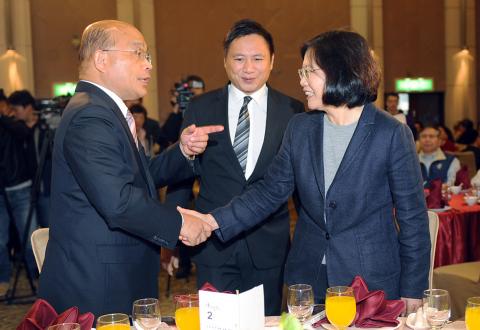The Democratic Progressive Party (DPP) continued to run into difficulties as it proceeded with its search for members for its China Affairs Committee, amid reports of dissent within the party.
Former premier Yu Shyi-kun, who was invited by DPP Chairman Su Tseng-chang (蘇貞昌) to join the committee, yesterday said: “Since I voiced opposition to the establishment of the committee, it would be inappropriate to join it.”
Yu is the second party heavyweight to turn down membership in the committee after former premier Frank Hsieh (謝長廷).

Photo: Lo Pei-der, Taipei Times
Meanwhile, Su, who is to be the committee’s convener, yesterday said the Chinese-language China Times distorted remarks he made in a report about an interview he had given on a local radio program on Friday.
“The host [of the show] asked me if there are some DPP members who want to pander to China and I answered that DPP members do not fawn on China, or they had better go to the Chinese Nationalist Party [KMT],” Su said.
The chairman said the China Times report had distorted his comment by saying he was referring to Hsieh, which was not his meaning.
Meanwhile, DPP Central Executive Committee member Cheng Wen-tsang (鄭文燦) also yesterday dismissed a report by the same newspaper that had alleged that DPP politicians from different factions had dined together on Friday evening and agreed with former DPP legislator Lin Cho-shui’s (林濁水) proposal that a bill should be tabled in the coming Central Executive Committee meeting to change the China Affairs Committee from a regular body to a three-month task force.
The report said Cheng would lead the group and propose the bill.
Cheng said he agreed with the establishment of the cross-strait policy body and that the report was mistaken in saying he planned to propose a bill to change it.
Lin yesterday said that there had been a dinner, but it was a simple social event planned by former DPP chairman Hsu Hsin-liang (許信良). The attendants did not discuss specific issues, nor make any party decisions, Lin added.
“Changing the China Affairs Committee to a three-month task force is my personal suggestion, not a conclusion that was reached at the dinner,” Lin said.
Lin added that the committee should deal with the DPP’s long-term China strategy, instead of regular cross-strait affairs.
Former DPP chairperson Tsai Ing-wen (蔡英文), who has agreed to join the committee, said that she did not know what the design and mechanism of the China body would be, but she respected the party’s decision and would collaborate with it.
The party decided to establish the China Affairs Committee at its Central Standing Committee meeting on Wednesday. Under Su’s plan, the cross-strait agency would consist of seven to nine members and an advisory board, and would hold bimonthly meetings.
The China Affairs Committee was established to be a decisionmaking platform on the DPP’s engagement with the Chinese Communist Party.

NATIONAL SECURITY THREAT: An official said that Guan Guan’s comments had gone beyond the threshold of free speech, as she advocated for the destruction of the ROC China-born media influencer Guan Guan’s (關關) residency permit has been revoked for repeatedly posting pro-China content that threatens national security, the National Immigration Agency said yesterday. Guan Guan has said many controversial things in her videos posted to Douyin (抖音), including “the red flag will soon be painted all over Taiwan” and “Taiwan is an inseparable part of China,” while expressing hope for expedited “reunification.” The agency received multiple reports alleging that Guan Guan had advocated for armed reunification last year. After investigating, the agency last month issued a notice requiring her to appear and account for her actions. Guan Guan appeared as required,

Japan and the Philippines yesterday signed a defense pact that would allow the tax-free provision of ammunition, fuel, food and other necessities when their forces stage joint training to boost deterrence against China’s growing aggression in the region and to bolster their preparation for natural disasters. Japan has faced increasing political, trade and security tensions with China, which was angered by Japanese Prime Minister Sanae Takaichi’s remark that a Chinese attack on Taiwan would be a survival-threatening situation for Japan, triggering a military response. Japan and the Philippines have also had separate territorial conflicts with Beijing in the East and South China

A strong cold air mass is expected to arrive tonight, bringing a change in weather and a drop in temperature, the Central Weather Administration (CWA) said. The coldest time would be early on Thursday morning, with temperatures in some areas dipping as low as 8°C, it said. Daytime highs yesterday were 22°C to 24°C in northern and eastern Taiwan, and about 25°C to 28°C in the central and southern regions, it said. However, nighttime lows would dip to about 15°C to 16°C in central and northern Taiwan as well as the northeast, and 17°C to 19°C elsewhere, it said. Tropical Storm Nokaen, currently

PAPERS, PLEASE: The gang exploited the high value of the passports, selling them at inflated prices to Chinese buyers, who would treat them as ‘invisibility cloaks’ The Yilan District Court has handed four members of a syndicate prison terms ranging from one year and two months to two years and two months for their involvement in a scheme to purchase Taiwanese passports and resell them abroad at a massive markup. A Chinese human smuggling syndicate purchased Taiwanese passports through local criminal networks, exploiting the passports’ visa-free travel privileges to turn a profit of more than 20 times the original price, the court said. Such criminal organizations enable people to impersonate Taiwanese when entering and exiting Taiwan and other countries, undermining social order and the credibility of the nation’s